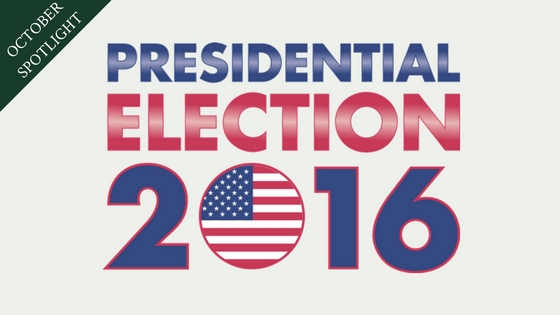Unless you’ve been living under a rock for the last few months, you’ll be well aware the two leading parties, Republicans and Democrats held elections earlier this year to decide who would be their nominated presidential candidate.
The larger-than-life Donald Trump was the person most responsible for making events so watchable. However, expectations were that sooner or later his push to become the Republican nominee would run out of steam.
The way that the city analysed the Presidential race came to a turning point when the UK voted to leave the European Union. Brexit proved to market analysts that when given the vote, the majority of the population were willing to make decisions that would have dramatic consequences rather than remain with the status quo. Since the global financial crisis in 2007 western societies, have become increasingly disenfranchised with the way their countries have been run. Change for the sake of change is a mindset that many now have as they willingly show how unsatisfied they are with the way their society is being run.
Can we trust opinion polls?
Before Brexit, the city had relied upon opinion polls or financial binaries, to give an indication as to who would be the likely victor in an election. The shock outcome of Brexit in the UK has seen the reliability of these tools being questioned.
In the current US election the “Mexican Peso Predictor” is the most popular tool being used to predict the outcome. The consequences of a Donald Trump victory in the US elections has seen the Mexican Peso’s strength linked to how well the Republican candidate has been performing. Goldman Sachs have stated that:
“We see a binary path for the Mexican Peso, with a 10% appreciation on a Clinton victory or a 15-20% depreciation on a Trump victory”.
The performance of the Mexican Peso now suggests that in the final month of this election, Hillary Clinton remains the favourite with a slender lead over Donald Trump. A lead that many thought would and should be considerably larger.
What are the consequences of a Hillary Clinton win?
If the Democratic candidate wins, then the financial world will see this as a vote to keep the status quo, a result that would make them happiest.
Hillary Clinton has already stated that she would increase government spending on infrastructure to the tune of US$275 Bn over the next 5 years. The Democrats would also try to raise the minimum wage, a move that would alter the current low unemployment levels enjoyed in the US. Her stance on global trade would see several treaties and agreements be reworked but fundamentally an outwardly positive stance to current international relationships.
Should Hillary Clinton come to power she would probably face the exact same problems that President Barack Obama has faced – resulting in a far less productive tenure than she would wish for. We may once again see a Democratic President battle with a Senate dominated by Republicans. And much like Obamacare many of the policies that Hillary Clinton will try to push through may ultimately get bogged down in bureaucracy.
And if Donald Trump wins?
There are less clear consequences.
The Republican nominee has been vague on many of his policies over the course of this election campaign. Digesting many of his public speeches highlights the extent of contradictory statements that he has previously made. He has voiced some extreme opinions such as getting Mexico to build a wall on its border with the USA, and these would be either very difficult or impossible to get pushed through as either a government policy or legislation.
Currency markets would show the swiftest and most aggressive reaction to a Republican victory with both the Chinese Renminbi and the Mexican Peso being the worst hit. Although his policies on international trade lack clarity, an overall more negative stance towards these trade relationships would mean a hit to export weighted equities.
If we look at what happened in the aftermath of the UK’s Brexit vote we could expect an aggressive spike in volatility as markets struggle to quantify what the implications are. However like the Brexit in the UK, it’s also reasonable to expect the volatility to fall away relatively quickly as very few changes would happen in the direct aftermath of the result.
Overall, whether Republicans or Democrats win, we would expect to see government spending increase. However if the Republicans win, whilst no figure has been stated this amount would likely exceed what the Democratic party would spend.
International Trade Agreements would come under close scrutiny and in several instances could well be terminated. On numerous occasions in the past, Donald Trump has been particularly disparaging about current trade agreements with China.
Currency Wars
Over the last few years the phrase “currency war” has been used many times as central banks have embarked on an progressively desperate bid to pump cash into the markets through quantitative easing. One of the knock-on effects of this has been the devaluation of currencies helping those nations with export driven economies.
If the Republican party and Donald Trump gain power, the status of the US Dollar as a global safe haven and reserve currency of choice could well be tested (although few alternatives have the same appeal). The inevitable weakness that will come in the US Dollar will see many central banks forced into action in order to counterbalance this. The Bank of Japan, Swiss National Bank, the Bank of Mexico and the Bank of China would all be closely monitored for intervention in the currency markets.
Which way will it swing?
In the run up to the debate between the two candidates, polls show that about 18% of the population are still undecided. This in comparison to only 6% at the same stage of the race last time between President Obama and Mitt Romney.
If you were to poll the average international observer as to who would make the best American President, Hillary Clinton would undoubtedly come top. However, it’s not the international public that get to decide but citizens of the US and they, like Trump himself, tend to have a considerably more insular view of the world. This looks set to remain a tight race right up until the 8th of November. The binary nature of the result and the polarized outcome should ensure that investors maintain a risk-off mindset as volatility remains high all the way to the end.
Timeline of events:
26th September: First Presidential debate
9th October: Second Presidential debate
19th October: Third Presidential debate
8th November: US Presidential and Congressional election
3rd January: New Congress convenes
20th January: Inauguration of new US President
Image by Mary Pahlke from Pixabay


